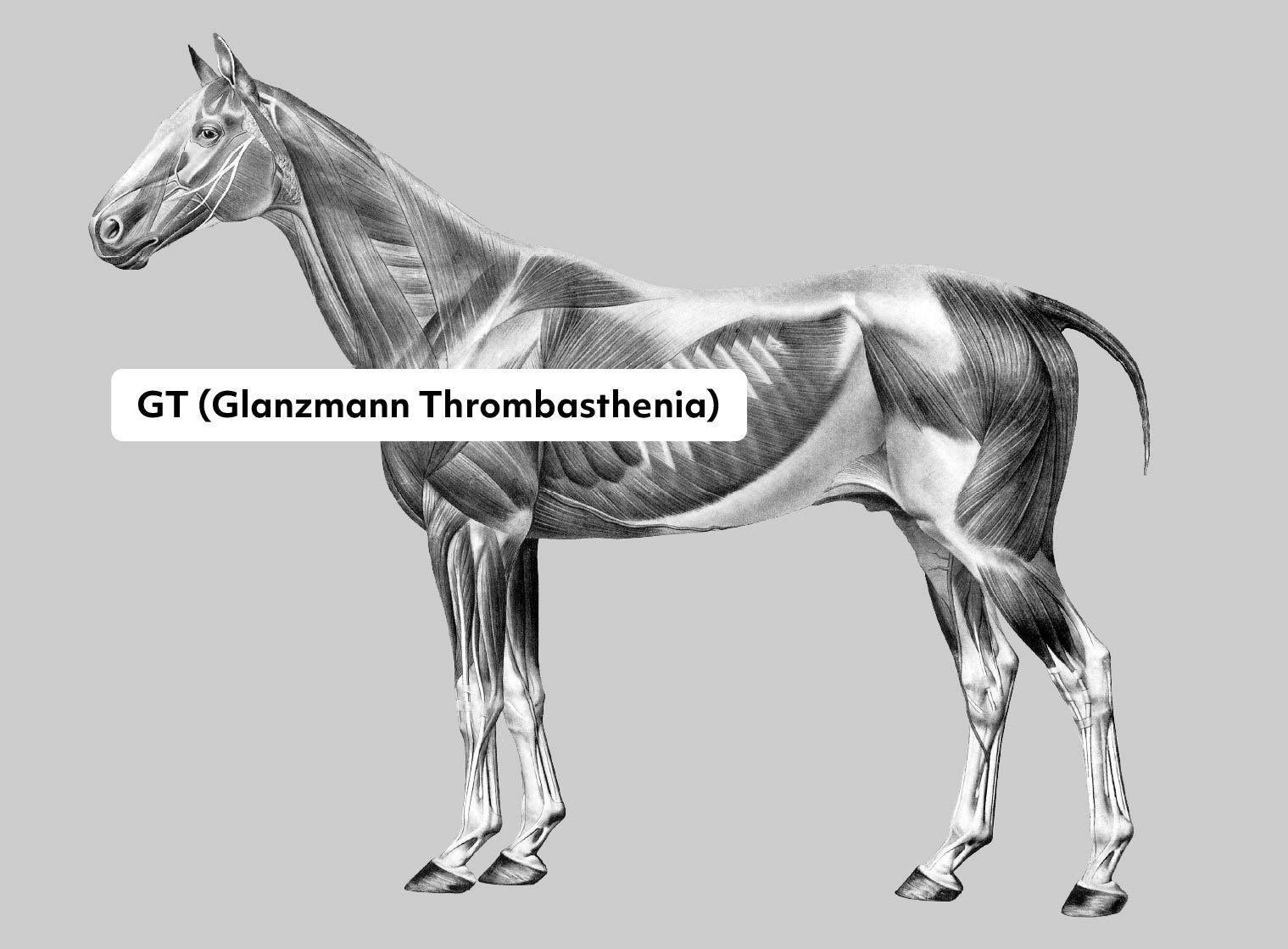Glanzmann Thrombasthenia (GT)
Gene or Region: ITGA2B
Reference Variant: G, 10bp indel (GACAGGTGAG)
Mutant Variant: C, - (deletion)
Affected Breeds: Thoroughbred, Standardbred, Oldenburg, Peruvian Paso, American Paint Horse, Appaloosa and American Quarter Horse
Research Confidence: Discovery - Findings require expanded validation
Explanation of Results: GT/GT = homozygous for Glanzmann Thrombasthenia, trait expressed GT/n = heterozygous for Glanzmann Thrombasthenia, trait possibly expressed n/n = no variant detected
General Description for Glanzmann Thrombasthenia (GT)
Glanzmann Thrombasthenia (GT) is an inherited platelet function disorder, resulting from a reduction in the platelet fibrinogen receptor protein. Clinical signs can be characterized by bleeding on the skin or from the mouth/nostril/gastrointestinal mucosas, and may include skin rashes with blood spots under the skin, nasal bleeding, gastrointestinal and gingival bleedings. Two mutations in the gene encoding platelet glycoprotein IIb, Integrin Alpha-2B (ITGA2B), have been implicated in the GT condition. Although GT has been associated with a recessive mode of inheritance, heterozygous combinations from both variants have been implicated in GT cases. GT can be a differential diagnosis for horses with platelet-type bleeding, especially nasal bleeding not related to exercise or of unknown origin (not thrombocytopenic or from von Willebrand disease).
Genotype
G/G and/or GACAGGTGAG/GACAGGTGAG: No variants - Negative for the known genetic factors of Glanzmann Thrombasthenia (GT). Horse may still have Glanzmann Thrombasthenia (GT) signs from novel/unknown mutations.
G/C or GACAGGTGAG: One allele (at either locus) - Horse is a carrier for Glanzmann Thrombasthenia (GT). Selective breeding is advised as to not produce homozygous or compound heterozygous offspring.
G/C and GACAGGTGAG/- ; or C/C ; or -/-: Two alleles (at either locus) - Horse is affected by Glanzmann Thrombasthenia (GT). Please consult with your attending veterinarian about management for this condition.
References
Christopherson, P.W., van Santen, V.L., Livesey, L. and Boudreaux, M.K. (2007), A 10-Base-Pair Deletion in the Gene Encoding Platelet Glycoprotein IIb Associated with Glanzmann Thrombasthenia in a Horse. Journal of Veterinary Internal Medicine, 21: 196-198. https://doi.org/10.1111/j.1939-1676.2007.tb02947.x
Christopherson PW, Insalaco TA, Santen VL van, Livesey L, Bourne C, Boudreaux MK. Characterization of the cDNA Encoding αIIb and β3 in Normal Horses and Two Horses with Glanzmann Thrombasthenia. Veterinary Pathology. 2006;43(1):78-82. doi:10.1354/vp.43-1-78
More Horse Health
Equine Herpes Virus Type 1 & Induced Myeloencephalopathy
Equine herpesviruses are DNA viruses that are found in most horses all over the world, often without any serious side effects. Following infection of Equine Herpesvirus Type 1 (EHV-1) some horses then suffer Equine Herpesvirus Myeloencephalopathy (EHM), which is is accompanied by serious and sometimes fatal neurological effects. EHM in horses can have serious neurological symptoms on affected horses.
Equine Metabolic Syndrome / Laminitis Risk
Equine Metabolic Syndrome (EMS) is a wide-spread issue in the horse population. Primarily characterized by hyperinsulinemia (excess insulin circulating in the blood in relation to glucose levels), this metabolic disorder is often present in obese horses and ponies and can be challenging to diagnose as it can be misdiagnosed as "Cushing's" (a pituitary disfunction).
Equine Recurrent Uveitis Risk and Severity
Equine Recurrent Uveitis (ERU) is the most common cause of blindness in horses, affecting about 3-15% of the horse population worldwide. Characterized by episodes of inflammation of the middle layer of the eye, Equine Recurrent Uveitis in horses leads to the development of cataracts, glaucoma and eventually complete loss of vision.
